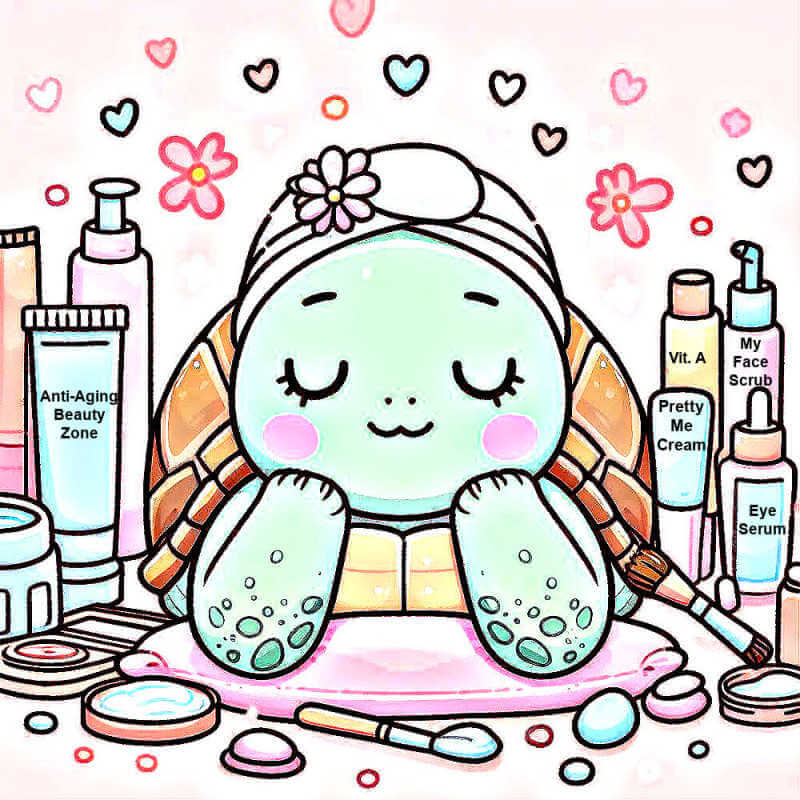- Home
- Facial Exercises
- Anti-aging Skincare Natural Tips for Over 50
- Anti-aging Face Cream
Anti-Aging Face Cream: 4 Tips to Get The Best Results
by: Linda Robison / Facial Fitness Specialist
Can an anti-aging face cream reduce the appearance of wrinkles?
According to the American Academy of Dermatology (AAD) over-the-counter or (drugstore) face creams do little or nothing to reverse wrinkles.
However, the AAD's statement typically refers to basic moisturizers marketed as "anti-aging" that lack potent ingredients like retinoids or peptides, which have proven anti-aging effects for the face.
Looking for the magic anti-aging cream

Aren't we all looking for that "special" inexpensive anti-aging cream that will erase wrinkles, spots and dull skin?
To be honest, I think we all know there is no such thing.
But there is hope!
There are over-the-counter and inexpensive drugstore products, (when used in combination) that can help smooth fine lines, lighten age spots and reduce the visible signs of face aging.
Keep reading, we'll show 4 simple tips that can make your face look great! Promise!
Which anti-aging products actually work?
Which anti-aging ingredients actually work?
Look for face creams and products that contain active ingredients proven in clinical research to produce visible results.
We've broken it down into four simple steps:
Reverse, Remove, Restore, Protect
Can damaged skin be reversed?
1. Reverse with Retinols
Reverse damaged aging skin with over-the counter (OTC) retinols (derivative of vitamin A).
There is no doubt, retinols are one of the best anti-wrinkle, anti-aging face creams around. Numerous studies support the anti-aging properties of OTC retinol cream.
Good News:
The good news, if you can't afford prescription retinoic acids, many over-the-counter, drugstore retinols do the job just fine. But, it might take longer to see results.
For example: A study published in the Journal of Cosmetic Dermatology compared how two types of vitamin A, retinol, and retinoic acid, affect the skin.
It found that topical application of retinol significantly improved the appearance of fine lines and wrinkles in participants over a period of 12 weeks.
Note: While there isn't much research comparing store-bought creams to prescription ones, it's still good news for people like me who cannot tolerate the side effects of retinoic acid. Since over-the-counter retinols are less irritating, I am able to through the "break-in" period easily and actually see results.
Side-Effects:
Even OTC creams may cause redness, dryness, and irritation. You want to AVOID this at all costs! Irritation can cause inflammation, which ages your skin!
So here are some tips to minimize them.
- Start Slowly: Go slow. Just because you bought it online or at Target, doesn't mean it's not strong. Apply the cream once or twice a week and gradually increase the frequency to build up to tolerance. This "break-in" period vary from person to person. So go at your own pace.
- Use Mild Potency: Start with a mild product. Super sensitive types should start with the lowest concentration (0.1.%) cream. Refer to this retinol cream starting tips guide for more information.
- Mix with Moisturizer: Try mixing retinol with your favorite hydrating cream. Or consider using retinol booster serums that are designed to be mixed with any cream you want.
See a breakdown of different types of OTC and drugstore retinol skin products that are effective and budget friendly.
At-home chemical peels are good for older skin
2. Remove Old Cells with AHA's
So you're using retinols to build collagen and healthy new cells. But you need to remove the outer layer of old, aged skin with exfoliating peels.
You want to encourage cell turnover to eliminate years of damaged cells, and allow new ones to surface.
Studies show that cosmetics with AHAs can help rejuvenate and improve skin texture, reduce wrinkles, and even out skin tone. They work by removing dead skin cells and stimulating collagen production, making skin firmer and smoother.
Doesn't the body naturally take of that? Yes, but sometime over the age of 40 our body's natural exfoliation ability slows down.
What Can You Do?
Give your face a gentle scrub or exfoliating peel at least once a month. This is essential for smoother, hydrated looking skin.
Personally, I use a homemade face scrub once a week and a chemical peel once a month. But, everyone is different. Pay attention to how your skin feels.
Side Effects:
All scrubs, peels and exfoliating products could potentially cause irritation. To minimize irritation, do this:
- Start Slowly: If you're new to exfoliating, use a gentle homemade one first.
- Test: Apply to a small area on your wrist before you face.
- Follow Instructions: If doing an at-home chemical peel, follow instructions.
- Moisturize: Exfoliating peels can dry the skin. Hydrate after each treatment.
- Wear Sunscreen: Peels can make your face sun sensitive.
- Timing: Don't use before or after potent active creams like retinol or peptides.
Need Some Ideas? Try These:
Try a natural homemade Himalayan salt or coffee scrub. They're cheap and pretty effective.
For something stronger, how about a fruit based lactic acid peel. Or, try an AHA based at-home chemical peel.
If found home chemical peels to be very effective to help reduce the appearance of brown spots.
What ingredients restore skin?
3. Restore with daily moisturizer cream
Yes, we know basic face creams or moisturizers can't reduce wrinkles.
But, don't underestimate an antioxidant rich, restorative hydrating moisturizer. The right product can feed, protect and strengthen your skin barrier.
Look for moisturizing creams that contain antioxidants and protective ingredients like lipids or ceramides.
Look for moisturizing creams that contain:
Ceramides: A study, in the American Journal of Clinical Dermatology, shows that ceramides can help older skin stay healthy by fixing the protective barrier. Making it look smoother, firmer, more hydrated and reduce wrinkling.
Antioxidants: Ingredients like vitamin C, vitamin E, green tea extract, and/or resveratrol.
Vitamin B3: Niacinamide for firmer skin.
Hyaluronic acid: A potent humectant that can hold up to 1000 times its weight in water, making it effective in hydrating the skin.
Suggested:
If your skin is very dry, an excellent anti-aging night cream to try is OmgaCermaide+ Recovery Moisturizer. It contains cermaides, omega-3 lipids and peptides.
However, the one above is a little too rich for me, so I use Moisturing Plus.
It contains mostly organic plant and essential oils to nourish, hydrate and have anti-inflammatory properties. Remember, inflammation causes aging!
Check out the antioxidant moisturizer guide for more info on selecting moisturizers that nourish and protect.
Can sunscreen prevent face aging
4. Protect with sunscreen
Protect your face with a good sunscreen!
Yeah, right! To be honest, I hate using sunscreen. The feel, the texture, the hassle of constant reapplication... Ugh!😒
BUT, that was until I read this study that found when people used sunscreen every day on their face for 12 weeks, (some continued up to 52 weeks), their skin got much better. The texture, clarity, and pigmentation improved a lot.
So researchers concluded that using sunscreen not only stops sun damage but can reverse existing damage!
So basically, if your face is showing photo-aging, you can reverse some of it just by using sunscreen daily.
What Kind of Sunscreen Should You Use:
The other part I hate about sunscreen, is choosing one. There are so many things to consider, like:
- SPF level or PA rating
- UVA, UVB or Broad-spectrum
- Water resistance or waterproof
- Chemical or physical (mineral) sunscreen
- Skin type (dry, oily, sensitive, acne-prone)
- Texture
- Tinted, moisturizing, or fragrance-free
Of course, each person is different and will need to decide the right type of sunscreen based on their needs.
While I can't make the decision for you, you can use this sunscreen guide to help you discover the one that's best suited to your needs.
Final takeaway: Anti-Aging Face Cream
So, bottom line, there is no such thing as a "magical" anti-aging face cream that will make you look 20 years younger!
But, there are 4 simple, effective, readily available over-the-counter products that can help reduce the signs of aging on the face:
- Use retinol creams to reverse skin damage and build collagen.
- Exfoliate with scrubs and/or alpha hydroxy acids (AHAs) to remove dead skin cells and promote cell turnover.
- Use a moisturizing cream with ingredients like ceramides, antioxidants, and hyaluronic acid to restore and nourish the skin.
- Protect the skin with daily sunscreen use, which can help reverse existing sun damage.
While this is just a broad, over-view guide, it's important to recognize that everyone's skin is unique, influenced by factors such as skin type, age, ethnicity, and where they live.
If you have specific issues, conditions, or question about using any of these products, it's best to consult with a dermatologist.
Anti-aging face cream: FAQ's
Got a question about this article? Please feel free to ask us here.
Q: What anti-aging products actually work?
A: Probably the most effective, over-the-counter anti-aging product you could use is a retinol cream or serum. Other anti-aging product can help hydrate and make the skin look better, but retinols actually eliminate damaged skin cells so newer, younger cells can come to the surface.
Q: How can I lift my face naturally?
A: Personally, I got excellent results using face exercises and massages. My face is more lifted and skin is tighter than it was 15 years ago. You can see my before and after pictures here.
Q: Which cream is best for skin tightening?
A: Over-the-counter creams can't really do much for tightening the skin. You can hydrate your face with hyaluronic acids and moisturizers, which can give a more lifted appearance - especially if your skin is dry.
Even better, look for moisturizers that are super hydrating and contain niacinamide or DMAE which has been shown to boost the production of collagen. This important protein that supports skin structure, making it firmer. But don't expect miracles.
Also, I have found that my face looks firmer after an at-home chemical peel treatment. Give it a try.
About the Author:
Linda Robison is a Facial Fitness Specialist and the founder of Anti-Aging Beauty Zone. She shares expert insights on skincare, facial rejuvenation, and beauty treatments—blending traditional wisdom, personal experience, and science-backed research for both at-home and in-office solutions.
Before you go ....
Please tap on the💙in the bottom right corner if you found this page helpful.
FOLLOW ME FOR MORE TIPS:
SHARE OR SAVE FOR LATER:

